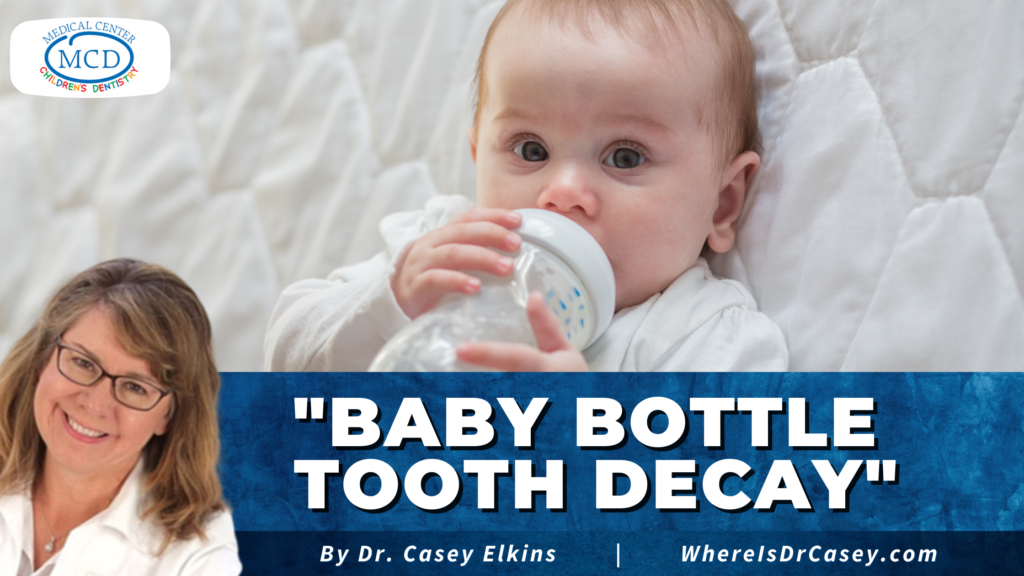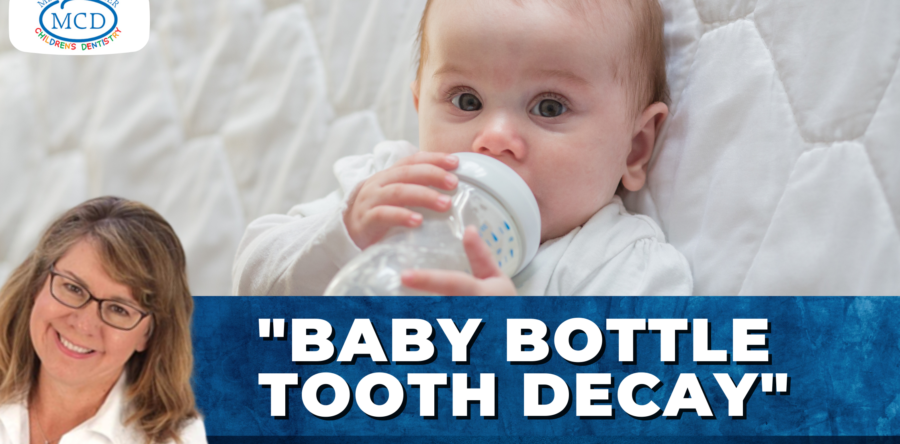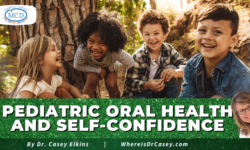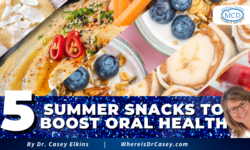
Even though baby teeth are not permanent, they are vital to your child’s oral health and are also still vulnerable to tooth decay. The American Dental Association recommends that parents start brushing their children’s teeth as soon as they start appearing. This doesn’t just develop good habits, it plays an important role in the condition of your child’s lifelong oral health.
Kids are not immune to cavities. In fact, tooth decay is the number one childhood disease! When an infant or a toddler develops cavities, this condition may also be referred to as “Baby Bottle Tooth Decay” or “Early Childhood Caries.” Just like adults, healthy teeth allow children to eat, speak, and express themselves. These are all very important to a child’s overall health and development! In fact, untreated tooth decay can have detrimental effects on a person's body through the Oral Systemic Link if it developed into periodontal disease!
Any tooth can be affected by these “Early Childhood Carries.” While it is most common for it to occur with the upper front teeth, we have seen cases that affect almost every baby tooth. Pediatric Dentists are specialized in treating dental issues among young patients, even tooth decay! We recommend that all kids have their first Pediatric Dentist appointment at around 6 months old, near the time their teeth are coming in. The health of a child’s baby teeth also plays an important role in ensuring that the child's adult teeth develop and come incorrectly. The health of a child’s baby teeth directly affects the health of their adult teeth before they ever even erupt.
What Is The Cause of “Baby Bottle Tooth Decay”?
According to the American Dental Association (ADA), there are a number of factors that can cause tooth decay among young infants and toddlers. Here are a few of the factors that we commonly see that can cause “Baby Bottle Tooth Decay”…
- Baby teeth having prolonged exposure to drinks that are high in sugar. Brushing after definitely helps, but we still recommend limiting sugary drinks. This can also accurate when a child consumes a lot of high-sugar frozen treats, such as popsicles and ice cream.
- Putting small children to bed with bottles. We also see this when bottles are consistently uses to “pacify” a fussy baby. The same goes for non-water drinks for toddlers at bedtime too! Children (and adults) should only consume water after they brush their teeth before bed. This is because the time we spend asleep gives bacteria and sugar the freedom to damage our teeth if we don’t brush before.
- Periodontal disease can be passed from caregivers to children too! Tooth decay can also start with bacteria known to cause cavities, which can be passed through saliva. Sharing food and utensils are easy ways for parents to accidentally pass these germs along.
These are the most common ways that we have seen “Baby Bottle Tooth Decay” develop among our patients. The truth is that tooth decay is 100% preventable through good, lifelong oral care! (Even if you’ve been exposed to cavity-causing bacteria, as most of us have.)
How Can Parents Prevent “Early Childhood Caries”?
There are a number of things that caregivers can do to ensure that their children do not develop tooth decay as infants or toddlers. Here are the best methods that Dr. Casey has found to prevent these childhood cavities.
- Ensure that your child receives an adequate amount of fluoride to decrease risk of tooth decay. Dentist and hygienists typically use fluoride to protect teeth after a dental cleaning. This is an easy way to be sure your child has received enough. Children’s toothpaste containing fluoride is another way to ensure your child’s teeth are getting the protection they need.
- Try not to share saliva with your child. This can be hard sometimes, especially with life’s unpredictability. As a parent herself, Dr. Casey knows how tempting it can be to “lick” the spoon or pacifier clean or even to use a little “lick” to wet a cloth to help wipe off a child’s face. As temping as it is, a clean baby wipe or washcloth is best.
- Start brush when the first teeth come in! Just like adults, children’s teeth should be brushed twice a day. We recommend using a child’s tooth brush and a “grain of rice” sized smear of children’s fluoride toothpaste until they are 3 years old. A peas-sized amount of toothpaste can be used from 3-6 years old.
- Avoid sugary drinks in your child’s bottles. It is recommended that children’s teeth don’t have prolonged exposure to sugary drinks. This is why we recommend bottles are only filled with formula, milk, or breast milk especially if the child is going to be sipping on it for a while. We recommend that parents avoid filling their child’s bottle with high-sugar liquids such as juices, soft drinks, and sweetened waters. These are better given as small, supervised servings to prevent prolonged exposure to their teeth.
- Always ensure that your child finishes bedtime bottles before they go to sleep. Before a child actually falls asleep, you should brush their teeth so that any residue from the food or bottles is washed away before they doze off. This is why we recommend giving your child their bedtime bottle, drink, or snack (depending on their age) before they actually are in bed. This makes it easier to remember to brush their teeth after and limits nighttime choking hazards.
- Clean pacifiers only! Don’t dip them! While it May sound like a yummy treat to you, it can actually be very harmful to dip your child’s pacifier in sugar or honey before giving it to them. This prolonged exposure to sugar can start to decay their teeth before they have fully come in. The same goes for teeth toys. An alternative is utilizing sensations such a warm or cold when mixing up pacifier and teething strategies.
- Encourage kids to start drinking from cups around their first birthday! Age one is around the time that most infants have achieved the dexterity to drink out of a cup with little to no assistance. Drinking from a cup instead of a bottle significantly decrease a child’s chance of developing cavities based on prolonged exposure.
- Healthy diet makes a difference too! As your child grows into trying more foods, making healthy food choices directly affects her oral health. Healthy eating habits start young and can lead to good, lifelong oral health for many of today’s children!
Setting up your child to have a lifetime of good, dental health takes some conscious effort! Your family deserves the benefits that commitment to consistent oral health routines brings. We believe part of that routine is checking in with your family’s pediatric dental team!
These are some of the reasons we recommend your child’s first dental visit is around 6 months old, around the time their teeth are coming in. This allows the Pediatric Dentist to assess their development and prevent future dental issues, such as cavities. If you are interested in learning more or to schedule an appointment with Medical Center Children’s Dentistry, feel free to contact us today.







1 Response